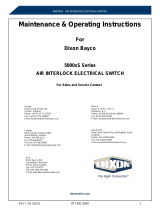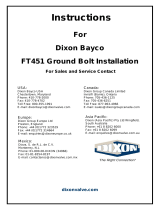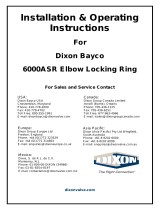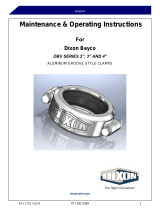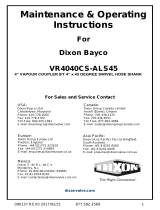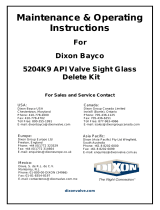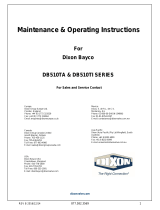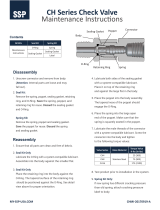Page is loading ...

090114 REV8 2018/08/24 877.582.3569 1
MAINTENANCE & OPERATING
INSTRUCTIONS
For DIXON BAYCO
5300/5400 SERIES
API RACK COUPLER
Model Numbers
For Sales & Service Contact
dixonvalve.com
5300 ................. BUNA SEALS, BONDED NOSE SEAL
5300SH ............ BUNA SEALS, BONDED NOSE SEAL, SHORT HANDLE
5300BSH ......... FKM-B SEALS, BONDED NOSE SEAL, SHORT HANDLE
5300GSH ......... FKM GFLT SEALS, BONDED NOSE SEAL, SHORT HANDLE
5300B .............. FKM-B SEALS, BONDED NOSE SEAL
5300G .............. FKM GFLT SEALS, BONDED NOSE SEAL
5400 ................. BUNA SEALS, REPLACEABLE NOSE SEAL
5400B .............. FKM-B SEALS, REPLACEABLE NOSE SEAL
5400G .............. FKM GFLT SEALS, REPLACEABLE NOSE SEAL
USA:
Dixon Bayco USA
Chestertown, Maryland
Phone: 410-778-2000
Fax: 410-778-4702
Toll Free: 800-355-1991
E-mail: dixonba[email protected]
Canada:
Dixon Group Canada Limited
Innisfil (Barrie), Ontario
Phone: 705-436-1125
Fax: 705-436-6251
Toll Free: 877-963-4966
E-mail: isales@dixongroupcanada.com
Mexico:
Dixva, S. de R.L. de C.V.
Monterrey, N.L
Phone: 01-800-00-DIXON (34966)
Fax: 01-81-8354-8197
E-mail: contactenos@dixonvalve.com.mx
Europe:
Dixon Group Europe Ltd
Preston, England
Phone: +44 (0)1772 323529
Fax: +44 (0)1772 314664
E-mail: enquiries@dixoneurope.co.uk
Asia Pacific:
Dixon (Asia Pacific) Pty Ltd
Wingfield, South Australia
Phone: +61 8 8202 6000
Fax: +61 8 8202 6099
E-mail: enquiries@dixonvalve.com.au

090114 REV8 2018/08/24 877.582.3569 2
5300/5400 SERIES API RACK COUPLER
Bill of Materials
Qty of Components per Unit
Item #
Description
Part #
5300
5300SH
5300B
5300BSH
5300G
5400
5400B
5400G
5300GS
H
1
Body
-
1
1
1
1
1
1
1
1
1
2
Body Dust Ring
112173
1
1
1
1
1
1
1
1
1
3
Sleeve Assembly
400684
1
1
1
1
1
1
1
1
1
4
Poppet
Use kit 5354K19
1
1
1
1
1
1
1
1
1
5
Bent Link
112151
2
2
2
2
2
2
2
2
2
6
Bent Link Pin
391141
2
2
2
2
2
2
2
2
2
7
Bent Link Washer
112158
2
2
2
2
2
2
2
2
2
8
Cotter Pin
110721
2
2
2
2
2
2
2
2
2
9
Drive link
112148
1
1
1
1
1
1
1
1
1
10
Interlocking Cam
112147
5
5
5
5
5
5
5
5
5
11
Torsion Spring
112149
6
6
6
6
6
6
6
6
6
12
Nose Piece Dust Ring
112174
1
1
1
1
1
1
1
1
1
13
Nose Piece
391138
N/A
N/A
N/A
N/A
N/A
1
1
1
N/A
14
PTFE U-Seal 350
(Optional)*
112164
1
1
1
1
1
1
1
1
1
15A
0-Ring 2-350, Baylast
Use kit 5354K7,
5354K8, 5354K13 or
5354K14
1
1
N/A
N/A
N/A
1
N/A
N/A
N/A
15B
0-Ring 2-350, FKM B
Use kit 5354K9,
5354K10, 5354K15 or
5354K16
N/A
N/A
1
1
N/A
N/A
1
N/A
N/A
15C
0-Ring 2-350, FKM GFLT
Use kit 5354K11,
5354K12, 5354K17 or
5354K18
N/A
N/A
N/A
N/A
1
N/A
N/A
1
1
16A
Replaceable Nose Seal,
Buna
Use kit 5354K13 or
5354K14
N/A
N/A
N/A
N/A
N/A
1
N/A
N/A
N/A
16B
Replaceable Nose Seal,
FKM B
Use kit 5354K15 or
5354K16
N/A
N/A
N/A
N/A
N/A
N/A
1
N/A
N/A
16C
Replaceable Nose Seal,
FKM GFLT
Use kit 5354K17 or
5354K18
N/A
N/A
N/A
N/A
N/A
N/A
N/A
1
N/A
16D
Bonded Nose Seal, Buna
Use kit 5354K7 or
5354K8
1
1
N/A
N/A
N/A
N/A
N/A
N/A
N/A
16E
Bonded Nose Seal, FKM B
Use kit 5354K9 or
5354K10
N/A
N/A
1
1
N/A
N/A
N/A
N/A
N/A
16F
Bonded Nose Seal, FKM
GFLT
Use kit 5354K11 or
5354K12
N/A
N/A
N/A
N/A
1
N/A
N/A
N/A
1
17
Bearing
341790
1
1
1
1
1
1
1
1
1
18
PTFE U-Seal 220
(Optional)*
112163
1
1
1
1
1
1
1
1
1
19A
0-Ring 2-220, Baylast
Use kit 5354K1 or
5354K2
1
1
N/A
N/A
N/A
1
N/A
N/A
N/A
19B
0-Ring 2-220, FKM B
Use kit 5354K3 or
5354K4
N/A
N/A
1
1
N/A
N/A
1
N/A
N/A
19C
0-Ring 2-220, FKM GFLT
Use kit 5354K5 or
5354K6
N/A
N/A
N/A
N/A
1
N/A
N/A
1
1
20
PTFE U-Seal 212
(Optional)*
112162
1
1
1
1
1
1
1
1
1
21A
0-Ring 2-212, Baylast
Use kit 5354K1 or
5354K2
2
2
N/A
N/A
N/A
2
N/A
N/A
N/A
21B
0-Ring 2-212, FKM B
Use kit 5354K3 or
5354K4
N/A
N/A
2
2
N/A
N/A
2
N/A
N/A
21C
0-Ring 2-212, FKM GFLT
Use kit 5354K5 or
5354K6
N/A
N/A
N/A
N/A
2
N/A
N/A
2
2
22
Wave Spring Washer
112172
2
2
2
2
2
2
2
2
2
23
Bail
341788
1
1
1
1
1
1
1
1
1
24
Bail Spring
112150
2
2
2
2
2
2
2
2
2
25
Bail Pin
112175
2
2
2
2
2
2
2
2
2
26
Internal Retaining Ring
112176
2
2
2
2
2
2
2
2
2
27
Release
391139
1
1
1
1
1
1
1
1
1
28
Washer
111562
3
3
3
3
3
3
3
3
3
29
Cotter Pin
111563
3
3
3
3
3
3
3
3
3
30
Shaft
391140
1
1
1
1
1
1
1
1
1
31
Shaft Cotter Pin
112307
1
1
1
1
1
1
1
1
1
32
Spacer
391142
1
1
1
1
1
1
1
1
1
33A
Handle
341789
1
N/A
1
N/A
1
1
1
1
N/A
33B
Short Handle
341823
N/A
1
N/A
1
N/A
N/A
N/A
N/A
1
34
Shaft Outside Washer
112160
1
1
1
1
1
1
1
1
1
35
Shaft Inside Washer
112159
1
1
1
1
1
1
1
1
1
36
Clevis Pin
112500
1
1
1
1
1
1
1
1
1
37
Latch
112240
1
1
1
1
1
1
1
1
1
* Items 14, 18 & 20 are optional PTFE U seals. When the U seals are added to the coupler they isolate the main rubber seals from the liquid being conveyed, thereby increasing the
longevity of the rubber seals.
N/A = "Not Applicable"

090114 REV8 2018/08/24 877.582.3569 3
Repair Kits
Part #
Description
Includes item #
5354K1
Baylast shaft seal kit: For 5300, 5300SH & 5400
19A, 21A, 31, 34, 35
5354K2
Baylast shaft seal kit with optional PTFE U Seals: For 5300, 5300SH & 5400
18*, 19A, 20*, 21A, 31, 34, 35
5354K3
FKM-B shaft seal kit: For 5300B, 5300BSH & 5400B
19B, 21B, 31, 34, 35
5354K4
FKM-B shaft seal kit with optional PTFE U Seals: For 5300B, 5300BSH &
5400B
18*, 19B, 20*, 21B, 31, 34, 35
5354K5
FKM GFLT shaft seal kit: For 5300G & 5400G, 5300GSH
19C, 21C, 31, 34, 35
5354K6
FKM GFLT shaft seal kit with optional PTFE U Seals: For 5300G & 5400G,
5300GSH
18*, 19C, 20*, 21C, 31, 34, 35
5354K7
Buna bonded nose seal kit: For 5300 & 5300SH
12, 13, 15A, 16D, 28, 29, 31, 36
5354K8
Buna bonded nose seal kit with optional PTFE U seal: For 5300 &5300SH
12, 13, 14*, 15A, 16D, 31
5354K9
FKM-B bonded nose seal kit: For 5300B & 5300BSH
12, 13, 15B, 16E, 28, 29, 31, 36
5354K10
FKM-B bonded nose seal kit with optional PTFE U seal: For 5300B &5300BSH
12, 13, 14*, 15B, 16E, 31
5354K11
FKM GFLT bonded nose seal kit: For 5300G, 5300GSH
12, 13, 15C, 16F, 28, 29, 31, 36
5354K12
FKM GFLT bonded nose seal kit with optional PTFE U seal: For 5300G,
5300GSH
12, 13, 14*, 15C, 16F, 31
5354K13
Buna replaceable nose seal kit: For 5400
12, 15A, 16A, 28, 29, 31, 36
5354K14
Buna replaceable nose seal kit with optional PTFE U seal: For 5400
12, 14*, 15A, 16A, 31
5354K15
FKM-B replaceable nose seal kit: For 5400B
12, 15B, 16B, 28, 29, 31, 36
5354K16
FKM-B replaceable nose seal kit with optional PTFE U seal: For 5400B
12, 14*, 15B, 16B, 31
5354K17
FKM GFLT replaceable nose seal kit: For 5400G
12, 15C, 16C, 31
5354K18
FKM GFLT replaceable nose seal kit with optional PTFE U seal: For 5400G
12, 14*, 15C, 16C, 31
5354K19
Valve assembly repair kit: For 5300, 5300SH, 5300B, 5300BSH, 5300G, 5400,
5400B, 5400G, 5300GSH
4, 5, 6, 7, 8, 9, 34, 31, 35
5354K29
Clevis handle repair kit
28, 29, 36
* Items 14, 18 & 20 are optional PTFE U seals. When the U seals are added to the coupler they isolate the main rubber seals from
the liquid being conveyed, thereby increasing the longevity of the rubber seals.

090114 REV8 2018/08/24 877.582.3569 4
API RACK COUPLER – 5300/5300SH/5300B/5300BSH/5300G/5400/5400B/5400G/5300GSH

090114 REV8 2018/08/24 877.582.3569 5
BEARING
ASSEMBLY
VALVE
ASSEMBLY
SHAFT AND
HANDLE ASSEMBLY

090114 REV8 2018/08/24 877.582.3569 6
NOSE PIECE
ASSEMBLY
SLEEVE
INSERT
NOTE:
SLEEVE ASSEMBLY SHOULD BE REPLACED AS A WHOLE. SLEEVE
ASSEMBLY SHOULD NOT BE DISASSEMBLED.
SLEEVE
ASSEMBLY
SLEEVE
INSERT PIN
SLEEVE

090114 REV8 2018/08/24 877.582.3569 7
PIN POSITIONS
FULLY CLOSED
HANDLE (33A), FOR 5300, 5300B,
5300G, 5400, 5400B, 5400G
SHORT HANDLE (33B) FOR
5300SH, 5300BSH, 5300GSH
SHAFT COTTER PIN (31)
CLEVIS PIN (36)
COTTER PIN (29)
COTTER PIN (8)

090114 REV8 2018/08/24 877.582.3569 8
These instructions and recommendations are provided to ensure proper operation and long service
life of the Dixon Bayco API rack coupler. Parts are identified by the item number on the assembly
drawing and part list.
SUGGUESTED MAINTENANCE SCHEDULE:
1. MONTHLY INSPECTION
Visual inspection of the API rack coupler operation can be done while the API rack coupler is still
on the loading arm. All safety precautions that apply to the use of the API rack coupler must be
followed.
While the API rack coupler is still on the loading arm, visually examine the API rack coupler for any
worn or damaged parts, such as the body (1), sleeve (3), handle (33), bail (23), poppet (4), nose
seal (16), interlocking cams (10), latch (37), flange bolts, etc, or any other condition that may affect
the operation of the API rack coupler.
Examine the API rack coupler to make sure that the API rack coupler functions well. See Clause 3
in Section “INSTALL API RACK COUPLER TO LOADING ARM” for procedures.
Check the handle (33) for free and easy movement of the opening and closing cycle. Operation of
the handle (33) normally requires limited effort. If operating the handle (33) involves stronger force,
it implies the need to clean and possibly replace the shaft bearing (17) and the shaft (30). When
this happens, replace the clevis pin (36) as well.
During service time when the line is filled with liquid product, visually check for evidence of
leakage, especially through the shaft seals (18, 19, 20, and 21), nose piece seals (14, 15), nose
seal (16) and the flange gasket. Any evidence of leakage means there is a need for further
maintenance.
2. YEARLY INSPECTION
For yearly inspection, the API rack coupler should be removed from the loading arm. See Section
“DISMANTLE API RACK COUPLER FROM LOADING ARM” for procedures of how to dismantle
the API rack coupler from the loading arm. See Section “DISASSEMBLY” for procedures of how to
disassemble the API rack coupler for further maintenance.
It is recommended that all seals (14, 15, 16, 18, 19, 20, and 21) should be inspected every 12
months. Replace any worn or damaged seals. See Section “REPLACE SEALS” for procedures.
It is recommended that the valve assembly should be inspected every 12 months. Check the bent
links (5), drive link (9) and poppet (4) carefully to make sure that there is no permanent
deformation, wear, cracking, or any other damage. Check the bent link pins (6) carefully to make
sure there is no permanent deformation such as bending and cracking. Replace any deformed,
worn or damaged parts in the valve assembly. See Section “REPLACE VALVE ASSEMBLY AND
PARTS” for procedures.
Warning: Deformed bent link pins (6), drive link (9) and bent links (5) may cause leakage through
poppet (4) seals. Further service of deformed bent link pins (6), drive link (9) and bent links (5) will
lead to cracks and breakage, which will cause a complete failure of the API rack coupler.

090114 REV8 2018/08/24 877.582.3569 9
Visually examine the shaft (30) every 12 months for significant dirt accumulation that could cause
shaft seal leakage. Visually examine the shaft (30), shaft inside washer (35), shaft outside washer
(34) handle (33) and clevis pin (36) for wear and damage. Replace any worn or damaged parts.
Warning: If the clevis pin (36) breaks, it can cause the poppet to be left in partially open position
which may cause spill. Replace the clevis pin (36) when it shows sign of wear or damage.
Visually examine the nose piece assembly every 12 months for significant dirt accumulation that
could cause nose piece seal leakage.
Visually examine the body (1), sleeve (3), interlocking cams (10), latch (37) and torsion springs
(11) for wear or damage every 12 months. Check the interlocking cam groove on the sleeve (3) for
wear and damage. Replace any worn or damaged parts.
Warning: If there is significant wear on the interlocking cam groove of the sleeve (3) or the
interlocking cams (10), replace the sleeve (3) or interlocking cams (10) immediately. Failure to
replace worn sleeve (3) and interlocking cams (10) can cause failure of interlock, which will result
in failure of the API rack coupler.
3. SEAL REPLACEMENT
It is recommended that seals should be replaced with appropriate API rack coupler seal kit every 2
years, or at the first evidence of leakage. See Section “REPLACE SEALS” for procedures.
4. OVERHAUL
It is recommended that a complete overhaul of the API rack coupler should be performed every 4
years, or at the first evidence of leakage. Complete overhaul would involve seal inspection and
replacement, valve assembly inspection, inspection of body (1), sleeve (3), shaft (30), interlocking
cams (10), latch (37) and springs (11, 24). Replace any worn or damaged parts immediately. See
corresponding sections for procedures.
CAUTION! WHEN THE API RACK COUPLER POPPET (4) IS UNDER PRESSURE, THE
HANDLE (33) OF THE API RACK COUPLER MAY ROTATE VIOLENTLY.
PERSONAL INJURIES MAY RESULT IF THIS PRECAUTION IS NOT TAKEN.
INSTALL API RACK COUPLER TO LOADING ARM:
Warning: Read and understand this instruction manual before starting installation.
1. Check the API rack coupler to make sure that there is no damage.
2. Secure the loading arm. Align the TTMA 4” flange of the API rack coupler to the loading arm
end flange with TTMA 4” gasket. Insert two bolts into the top bolt holes on the flanges and
hand tighten the bolts first. Install the remaining six bolts and tighten all the bolts.
3. Make sure that all other devices for the loading arm are properly installed and ready for use.
Make sure that there is no liquid product in the line. Snap the API rack coupler onto an API
adapter. Check the followings:
Make sure that the nose ring of API adapter is locked by the five interlocking cams (10) of
the API rack coupler.
Make sure that the sleeve (3) moves fully forward to the outlet of the API rack coupler.

090114 REV8 2018/08/24 877.582.3569 10
If the sleeve (3) is in place, check the interlock by pulling back the API rack coupler or
bending the API rack coupler sideways without triggering the release (27). The API rack
coupler should be locked tightly.
If the API rack coupler is locked tightly, fully rotate the handle (33) to the open position.
Make sure that the handle (33) can rotate freely and the poppet (4) of the API rack
coupler can push the poppet of the API adapter to the open position.
When the poppet (4) of the API rack coupler is in the open position, try to trigger the
release (27) to make sure that the sleeve (3) is locked by the interlocking cam surface of
the handle (33).
Rotate the handle (33) to fully closed position. Trigger the release (27). The sleeve (3)
should move back and five interlocking cams (10) should unlock the nose ring of the API
adapter. The API rack coupler should be able to be removed from the API adapter.
If there are problems with any of the above, see the following section to dismantle the API
rack coupler from the API adapter and remove the API rack coupler from the loading arm.
See Section “DISASSEMBLY” for further instructions of how to disassemble the API rack
coupler to inspect individual parts. Contact the factory if it is a new API rack coupler.
DISMANTLE API RACK COUPLER FROM LOADING ARM:
Warning: Read and understand this instruction manual before starting installation. Make sure that
there is adequate personal protection all the time when dismantling the API rack coupler from the
loading arm.
1. Shut off all working devices. Drain the loading arm. Dismantle the API rack coupler when it
is clean and dry.
2. Secure the loading arm from movement and support the API rack coupler. Make sure that
the API rack coupler is fully closed.
3. Loosen the bolts on the TTMA flange of the API rack coupler. Leave the two top bolts on
and remove the remaining six bolts first. And then remove the two top bolts.
4. Remove the API rack coupler from the loading arm. Remove the TTMA gasket between the
flanges.
REPLACE VALVE ASSEMBLY AND PARTS:
Note: Valve assembly (poppet assembly) and parts can only be replaced when the API rack
coupler is off the rack. The design of the Dixon Bayco API rack coupler shaft (30) makes it easy to
remove the valve assembly from the API rack coupler as a whole. This makes it easy to replace
the whole valve assembly or any individual part of the valve assembly. There is NO need to
remove the bent link pin (6) from the bent links (5) while the valve assembly is still in the API rack
coupler.
Warning: Carefully handle the poppet (4) without damaging the sealing surface when replacing
valve assembly or parts. Even the smallest scratches on the sealing surface can cause leakage.
1. When the API rack coupler is off the rack, DO NOT remove the handle cotter pin (29),
washer (28) and clevis pin (36) from the shaft (30). When the API rack coupler is closed,
remove the shaft cotter pin (31) from the shaft (30) by using pliers.
2. Defeat the interlock manually or use an API adapter nose ring so the sleeve (3) can move
fully forward to the outlet of the API rack coupler.
3. Turn the handle (33) to open the API rack coupler.

090114 REV8 2018/08/24 877.582.3569 11
4. Pull out the shaft and handle assembly with the shaft outside washer (34) and dust O-ring
(21). The valve assembly will fall free of the shaft (30). The spacer (32) and the shaft inside
washer (35) will also fall free of the shaft (30).
5. Inspect all parts of the valve assembly. Replace any damaged parts in the valve assembly.
When reassembling the valve assembly, make sure the bent links (5) and the drive link (9)
are assembled in the same orientation as shown in the valve assembly figure.
6. Assemble the shaft and handle assembly to the body (1) through the bearing (17).
Assemble the shaft inside washer (35), the drive link (9) and the spacer (32) before pushing
the other end of the shaft (30) into the shaft (30) end pocket on the body (1). Pay attention
to the orientation of the valve assembly.
7. Rotate the handle (33) to fully closed position. Rotate handle back 1 turn & install the shaft
cotter pin (31) onto the shaft (30).
8. Check the API rack coupler with an API adapter to make sure all components are
assembled properly.
REPLACE SEALS:
Warning: Carefully remove and install parts without damaging any sealing surfaces when
replacing seals. Even the smallest scratches on the O-ring groove or other sealing surface will
cause leakage.
Note: Remove any burrs and sharp edges that could damage the seals during reassembly.
There are different ways that seals can be replaced in the API rack coupler.
Replace shaft seals in stuffing box while API rack coupler is still on the rack
Note: This is a standard feature of Dixon Bayco the API rack coupler. Shaft seals (18, 19, 20, and
21) can always be replaced while the API rack coupler is still on the rack.
1. Shut off all working devices. Drain the loading arm. Only replace the API rack coupler shaft
seals when the API rack coupler is clean and dry.
2. Defeat the interlock manually or use an API adapter nose ring so the sleeve (3) can move
fully forward to the outlet of the API rack coupler.
3. Turn the handle (33) to open the API rack coupler.
4. Remove the handle cotter pin (29), the washer (28) and the clevis pin (36).
5. Remove the handle (33), the shaft outside washer (34), the dust O-ring (21) from the shaft
(30) end.
6. Remove the bearing assembly from the stuffing box by pulling it out with your hands. When
pulling the bearing assembly, loosen the bearing assembly by twisting the flange of the
bearing (17). If needed, use flat screw drivers from the back of the flange of the bearing (17)
to loosen the bearing assembly. Make sure not to damage the body (1).
7. Remove the O-rings (19, 21) and the u-seals (18, 20, optional) from the bearing assembly,
inspect for any wear or damage. Make sure not to damage the bearing (17) or scratch
sealing surfaces.
If the bearing (17) is good, thoroughly clean the bearing (17) to remove any debris, oil
and grease. Lubricate NEW O-rings (21 for inside groove and 19 for outside groove).
Install the new O-rings (19, 21) into the grooves. If u-seals (18, 20) are ordered, lubricate
NEW u-seals (20 for inside groove and 18 for outside groove). Install the new u-seals (18,
20) into the grooves. Handle the u-seals (18, 20) carefully and make sure not to damage
the u-seals (18, 20).

090114 REV8 2018/08/24 877.582.3569 12
If the bearing (17) is already damaged or has scratches on the sealing surfaces, replace
the bearing assembly with a NEW bearing assembly, which includes the bearing (17), the
inside O-ring (21), the outside O-ring (19), the inside u-seal (20, optional) and the outside
u-seal (18, optional).
8. Apply grease on the bearing (17) and install the bearing assembly into the stuffing box by
pushing with your hands through the shaft (30) end.
9. Assemble the NEW dust O-ring (21), the NEW shaft outside washer (34) and the handle
(33). Replace the handle (33) if it is damaged.
10. Assemble the clevis pin (36), the washer (28) and the handle cotter pin (29). Replace with a
new part if any of these are worn or damaged.
11. Check the API rack coupler with an API adapter to make sure all components are
assembled properly.
Replace nose seal while API rack coupler is on the rack
Note: While the API rack coupler is still on the rack, nose seal (16) can be replaced only if the API
rack coupler has a replaceable nose seal (16) option.
1. Shut off all working devices. Drain the loading arm. Only replace the API rack coupler nose
seal (16) when the API rack coupler is clean and dry.
2. While the API rack coupler is closed, defeat the interlock manually so the sleeve (3) can
move fully forward to the outlet of the API rack coupler. Rotate the handle (33) to fully open
position so the poppet (4) is in the open position.
3. Remove the replaceable nose seal (16) by using your hands or any rubber seal removal
device. Inspect the seal groove on the nose piece (13) for any wear and damage. Make sure
not to damage the nose piece (13). If there is damage on the nose piece (13) or scratches
on sealing surfaces of the nose piece (13), replace the nose piece assembly. See Section
“Replace the seals on the nose piece while API rack coupler is off the rack” for
procedures of how to replace the nose piece assembly.
4. Replace the nose seal (16) with a NEW replaceable nose seal (16).
5. Rotate the handle (33) to fully closed position. Make sure the sleeve (3) moves fully
backward.
6. Check the API rack coupler with an API adapter to make sure all components are
assembled properly.
Replace shaft seals in stuffing box while API rack coupler is off the rack
Note: Shaft seals (18, 19, 20, and 21) can always be replaced while the API rack coupler is still on
the rack. While the API rack coupler is off the rack, shaft seals (18, 19, 20, and 21) can be replaced
in the same way while the API rack coupler is on the rack. See Section “Replace shaft seals in
stuffing box while API rack coupler is still on the rack” for procedures. While the API rack
coupler is off the rack, shaft seals (18, 19, 20, and 21) can also be replaced using the method
described here.
1. When the API rack coupler is off the rack, DO NOT remove the handle cotter pin (29), the
washer (28) and the clevis pin (36) from the shaft (30). When the API rack coupler is closed,
remove the shaft cotter pin (31) from the shaft (30) by using pliers.
2. Defeat the interlock manually or use an API adapter nose ring so the sleeve (3) can move
fully forward to the outlet of API rack coupler.
3. Turn the handle (33) to open the API rack coupler.
4. Pull out the shaft and handle assembly with the shaft outside washer (34) and dust O-ring
(21). The valve assembly will fall free of the shaft (30). The spacer (32) and the shaft inside
washer (35) will also fall free of the shaft (30).

090114 REV8 2018/08/24 877.582.3569 13
5. Remove the bearing assembly from the stuffing box by pulling it out with your hands. When
pulling the bearing assembly, loosen the bearing assembly by twisting the flange of the
bearing (17). If needed, use flat screw drivers from the back of the flange of the bearing (17)
to loosen the bearing assembly. Make sure not to damage the body (1).
6. Remove the O-rings (19, 21) and the u-seals (18, 20, optional) from the bearing assembly
and make sure not to damage the bearing (17) or scratch sealing surfaces.
If the bearing (17) is good, thoroughly clean the bearing (17) to remove any debris, oil
and grease. Lubricate NEW O-rings (21 for inside groove and 19 for outside groove).
Install the new O-rings (19, 21) into the grooves. If u-seals (18, 20) are ordered, lubricate
NEW u-seals (20 for inside groove and 18 for outside groove). Install the new u-seals (18,
20) into the grooves. Handle the u-seals (18, 20) carefully and make sure not to damage
the u-seals (18, 20).
If the bearing (17) is already damaged or has scratches on the sealing surfaces, replace
the bearing assembly with a NEW bearing assembly, which includes the bearing (17), the
inside O-ring (21), the outside O-ring (19), the inside u-seal (20, optional) and the outside
u-seal (18, optional).
7. Apply grease on the bearing (17) and install the bearing assembly into the stuffing box by
pushing with your hands.
8. Replace the shaft outside washer (34) and dust O-ring (21) with NEW ones on the shaft
(30).
9. Assemble the shaft and handle assembly with the shaft outside washer (34) and dust O-ring
(21) to the body (1) through the bearing (17). Assemble the shaft inside washer (35), the
drive link (9) and the spacer (32) before pushing the other end of the shaft (30) into the shaft
(30) end pocket on the body (1). Pay attention to the orientation of the valve assembly.
10. Rotate the handle (33) to fully closed position. Install the shaft cotter pin (31) onto the shaft
(30).
11. Check the API rack coupler with an API adapter to make sure all components are
assembled properly.
Replace the seals on the nose piece while API rack coupler is off the rack
Note: Nose piece seals, including O-ring (15), nose piece dust ring (12) and optional u-seal (14),
can only be replaced when the API rack coupler is off the rack. Bonded nose seal (16) can only be
replaced by replacing the nose piece assembly if the API rack coupler has a bonded nose seal (16)
option. Nose seal (16) can be replaced when the API rack coupler is still on the rack, if the API rack
coupler has a replaceable nose seal (16) option. See Section “Replace nose seal while API rack
coupler is on the rack” for procedures.
1. When the API rack coupler is off the rack, DO NOT remove the handle cotter pin (29), the
washer (28) and the clevis pin (36) from the shaft (30). When the API rack coupler is closed,
remove the shaft cotter pin (31) from the shaft (30) by using pliers.
2. Defeat the interlock manually or use an API adapter nose ring so the sleeve (3) can move
fully forward to the outlet of the API rack coupler.
3. Turn the handle (33) to open the API rack coupler.
4. Pull out the shaft and handle assembly with the shaft outside washer (34) and dust O-ring
(21). The valve assembly will fall free of the shaft (30). The spacer (32) and the shaft inside
washer (35) will also fall free of the shaft (30).
5. Remove the nose piece assembly, which includes the nose piece (13), nose seal (16), O-
ring (15), nose piece dust ring (12), u-seal (14, optional). Remove the wave spring washers
(22).
If the API rack coupler is equipped with bonded nose seal (16), simply replace the whole
nose piece assembly with a new one.

090114 REV8 2018/08/24 877.582.3569 14
If the API rack coupler is equipped with replaceable nose seal (16),
(1) Remove nose seal (16), O-ring (15), nose piece dust ring (12) and u-seal (14, if
applicable) from the nose piece (13).
(2) Inspect the nose piece (13) and make sure the nose piece (13) is not damaged.
Clean seal surfaces carefully.
(3) Replace nose seal (16), O-ring (15), nose piece dust ring (12) and u-seal (14, if
applicable) with new ones.
6. Assemble the wave spring washers (22) and nose piece assembly.
7. Assemble the shaft and handle assembly with the shaft outside washer (34) and dust O-ring
(21) to the body (1) through the bearing (17). Assemble the shaft inside washer (35), the
drive link (9) and the spacer (32) before pushing the other end of the shaft (30) into the shaft
(30) end pocket on the body (1). Pay attention to the orientation of the valve assembly.
8. Rotate the handle (33) to the fully closed position. Install the shaft cotter pin (31) onto the
shaft (30).
9. Check the API rack coupler with an API adapter to make sure all components are
assembled properly.
DISASSEMBLY:
Warning: Carefully remove parts without damaging any sealing surfaces when disassembling the
API rack coupler. Even the smallest scratches on the O-ring grooves or other sealing surfaces will
cause leakage.
1. When the API rack coupler is off the rack and fully closed, remove the shaft cotter pin (31)
from the shaft (30) by using pliers.
2. Defeat the interlock manually or use an API adapter nose ring so the sleeve (3) can move
fully forward to the outlet of the API rack coupler.
3. Turn the handle (33) to fully open the API rack coupler. Pull out the shaft and handle
assembly with shaft outside washer (34) and dust O-ring (21). The valve assembly will fall
free of the shaft (30). The spacer (32) and the shaft inside washer (35) will also fall free of
the shaft (30).
To completely disassemble the shaft and handle assembly, remove the handle cotter pin
(29), the washer (28) and the clevis pin (36). Remove the handle (33), the shaft outside
washer (34), the dust O-ring (21) from the shaft (30) end.
To completely disassemble the valve assembly, remove the bent link cotter pins (8), bent
link washers (7) and bent link pins (6).
4. Remove the bearing assembly from the stuffing box simply by pulling it out with your hands.
If needed, use flat screw drivers from the back of the flange of the bearing (17) to help the
bearing assembly out.
To completely disassemble the bearing assembly, remove O-rings (19, 21) and u-seals
(18, 20, optional) from the bearing (17).
5. Remove cotter pins (29) and washers (28) from the release (27) ends. Remove the release
(27) from the bail (23).
6. Remove the retaining rings from the bail pins (25) by screw drivers or pointers.
7. Turn the API rack coupler upside down and the bail pins (25) will fall out. If the bail pins (25)
do not fall out, move the bail springs (24) until the bail pins (25) fall out.
8. Remove the bail springs (24) and the bail (23).
9. Remove the sleeve (3) from the body (1) by pulling the sleeve (3) to the inlet of the body (1).
10. Remove the five interlocking cams (10) from the body (1). Remove the latch (37) from the
body. Remove the six torsion springs (11) from the body (1). Remove the body dust ring (2)
from the body (1).

090114 REV8 2018/08/24 877.582.3569 15
11. Remove the nose piece assembly. If needed, use a screw driver and a hammer to push the
wave spring washers (22) from the body (1) inlet to help the nose piece assembly out.
Remove the wave spring washers (22).
Warning: Use the screw driver and hammer to push the wave spring washers (22) only. Do
not use the screw driver and hammer to push the nose piece (13) out from the inlet of the
body (1). This will damage the nose piece (13) surface.
To completely disassemble the nose piece assembly, remove the O-ring (15), nose piece
dust ring (12) and u-seal (14, optional) from the nose piece (13). For replaceable nose
piece assembly, remove the nose seal (16) from the nose piece (13).
ASSEMBLY:
1. Assemble the bearing assembly if it is disassembled. See Section “Replace shaft seals
in stuffing box while API rack coupler is still on the rack” for procedures of how to
assemble the bearing assembly.
2. Assemble the valve assembly if it is disassembled. See Section “REPLACE VALVE
ASSEMBLY AND PARTS” for procedures of how to assemble the valve assembly.
3. Assemble the nose piece assembly if it is disassembled. See Section “Replace the
seals on the nose piece while API rack coupler is off the rack” for procedures of
how to assemble the nose piece assembly.
4. Assemble the shaft and handle assembly if it is disassembled. Install the dust O-ring (21),
shaft outside washer (34), handle (33), clevis pin (36), washer (28) and handle cotter pin
(29) to the shaft (30).
5. Install the body dust ring (2) to the body dust groove.
6. Install the torsion springs (11), the latch (37) and the interlocking cams (10) to the body
(1).
7. Install the wave spring washers (22) and the nose piece assembly to the body (1).
8. Install the sleeve (3) to the body (1). Push in the five interlocking cams (10) manually so
the sleeve (3) can move fully forward to the outlet of the API rack coupler. Use nose ring
of API adapter or ask others for assistance.
9. Install the bearing assembly into the stuffing box by pushing with your hands.
10. Install the shaft and handle assembly to the body (1) through the bearing (17). Assemble
the shaft inside washer (35), the drive link (9) of the valve assembly and the spacer (32)
before pushing the other end of the shaft (30) into the shaft (30) end pocket on the body
(1). Pay attention to the orientation of the valve assembly.
11. Rotate the handle (33) to fully closed position. Install the shaft cotter pin (31) onto the
shaft (30).
12. Install the bail (23), bail springs (24), bail pins (25) and internal retaining rings (26) to the
body (1).
13. Install the release (27) to the bail (23). Install the washers (28) and cotter pins (29) to the
ends of release (27).
14. Rotate the handle (33) to the open position and closed position several times to verify
proper operation.
15. When the handle (33) is in the closed position, trigger the release (27) so the sleeve (3)
can move fully backward to lock the handle (33). The API rack coupler should not be
able to be opened by rotating the handle (33).
16. Check the API rack coupler with an API adapter to make sure all components are
assembled properly.
Warning: If the sleeve subassembly (3) and interlocking cams (10) are disassembled
and replaced, try coupling and uncoupling the API rack coupler to an API adapter nose
ring a few times making sure the locking mechanism functions well before putting the
API rack coupler back onto the loading arm.

090114 REV8 2018/08/24 877.582.3569 16
DIXON WARRANTY:
For Warranty Information, please refer to the inside back cover of the latest Dixon
Catalogue.
/

